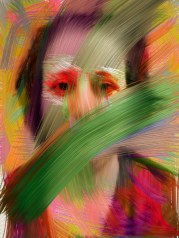
Here is a big secret: the degree to which your therapist or healer is themselves self-regulated greatly influences your healing outcome. About 76% of people who seek out therapy experience improvement. Is that simply the act of seeking support or is it something more? Is it the therapeutic relationship? A study of the therapeutic relationship shows that the therapist’s own internal relational model has a measurable effect on the outcome of therapy for their clients. I believe this is true for non-therapist supportive relationships also, including Reiki practitioners, massage therapists, even your hair stylist. Relationships matter, and who we are in a relationship with has an effect.
A continually improving and excellent relationship with your therapist is a key component of recovering from trauma. A healer or therapist who is themselves self-regulated (grounded, present and calm) co-regulates with their client to empower their client’s healing outcome. That is not the entire picture, but it’s a big piece of it.
It is incumbent on all of us as responsible Reiki practitioners to work on our own blind spots, wounds and trauma. Because of mirror neurons, and the highly attuned observational skills of most trauma survivors, they can sniff out when someone is just acting calm and “together”.

Mirror neurons and the traumatized
A mirror neuron is a neuron that fires both when an animal acts and when the animal observes the same action performed by another. Thus, the neuron “mirrors” the behavior of the other, as though the observer were itself acting. (source: Wikipedia)
Increased empathy is an outcome of early trauma. Perhaps as trauma survivors we had to rely on mirroring behaviors to survive, and giving us an enhanced, sometimes unnatural awareness of others. We often talk about the negative outcomes like aggressive behavior and major depression, but resilience, increased empathy and self-improvement traits are some of the gifts that trauma can bring us. With this increased empathy, comes a great bullsh*t detector. That is why all practitioners who wish to help others transform their trauma must first start with themselves.
All practitioners who wish to help others transform their trauma must first start with themselves
For years, I thought I could fake being a calm person. Sure, there were times when I was actually calm, and most of the time I spent with clients in my massage/Reiki practice were those times. But there were times when I didn’t feel that way, and I thought I could just take a deep breath, set it aside and basically, fake it for my clients, friends and family. I fooled some people, but I could never fool another trauma survivor. They know all the tricks and I could not pretend hard enough to get past this detecting system.
But starting in 2018, I underwent a transformation: I learned about self-regulation. I found NeurOptimal neurofeedback and I learned practical and usable self-regulation skills. I’m also learning my boundaries and limits and when to say I’ve taken on too much. I’m a work in progress, but I don’t “fake” it any more. Not only am I an experienced Reiki and energy work practitioner, I am well regulated, grounded and genuinely calm. (PS – I got so much benefit from the neurofeedback that I also opened a practice to share this also).
What I can do for you
I teach my clients and students to self-regulate. I help them feel safe enough to benefit from the deep relaxation of Reiki. I empower them to stay calm in stressful situations and build a relaxed body practice that builds, moment by moment, a life where trauma is a memory and not a living nightmare.
My students get Reiki attuned, but also learn how to incorporate Trauma Informed practices and how to create collaborative safe spaces in each session. I show them that they can build a daily practice of Reiki and self-regulation that will transform their lives to a place where creativity, self-compassion and calm lead the way.
